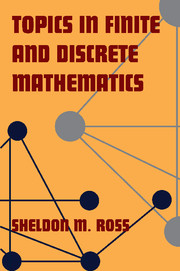2 - Combinatorial Analysis
Published online by Cambridge University Press: 06 July 2010
Summary
Introduction
Many problems can be solved simply by counting the number of different ways that a certain event can occur. In this chapter we show how one can efficiently do the counting in a variety of situations. In Section 2.2 we present the basic principle of counting, which is easily derived and extremely useful. Permutations are considered in Section 2.3 and combinations in 2.4. In Section 2.5, we consider the number of different solutions of certain integral linear equalities. A counting method based on inclusions and exclusions is presented in Section 2.6, and one based on deriving and solving recursion equations is presented in Section 2.7.
The Basic Principle of Counting
The following principle of counting will be basic to our work. Loosely put, it states that if an experiment consists of two parts, the first of which can result in any of m possible outcomes and the second in any of n possible outcomes, then there are a total of mn possible outcomes of the experiment.
Basic Principle of Counting Consider an experiment that consists of two phases. If the first phase can result in any of m possible outcomes and if, for each outcome of the first phase, there are n possible outcomes of the second phase, then there are a total of mn possible outcomes of the experiment.
Information
- Type
- Chapter
- Information
- Topics in Finite and Discrete Mathematics , pp. 34 - 69Publisher: Cambridge University PressPrint publication year: 2000
Accessibility standard: Unknown
Why this information is here
This section outlines the accessibility features of this content - including support for screen readers, full keyboard navigation and high-contrast display options. This may not be relevant for you.Accessibility Information
- 1
- Cited by
